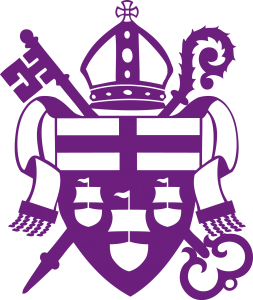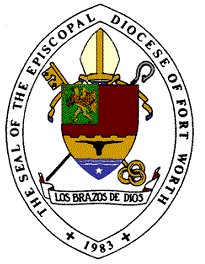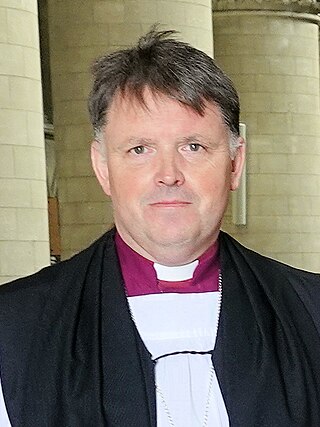
A parish is a territorial entity in many Christian denominations, constituting a division within a diocese. A parish is under the pastoral care and clerical jurisdiction of a priest, often termed a parish priest, who might be assisted by one or more curates, and who operates from a parish church. Historically, a parish often covered the same geographical area as a manor. Its association with the parish church remains paramount.
A pastor is the leader of a Christian congregation who also gives advice and counsel to people from the community or congregation. In Lutheranism, Catholicism, Eastern Orthodoxy, Oriental Orthodoxy and Anglicanism, pastors are always ordained. In Methodism, pastors may be either licensed or ordained.
A parochial church council (PCC) is the executive committee of a Church of England parish and consists of clergy and churchwardens of the parish, together with representatives of the laity. It has its origins in the vestry committee, which looked after both religious and secular matters in a parish. It is a corporate charitable body.
A churchwarden is a lay official in a parish or congregation of the Anglican Communion or Catholic Church, usually working as a part-time volunteer. In the Anglican tradition, holders of these positions are ex officio members of the parish board, usually called a vestry, parochial church council, or in the case of a Cathedral parish the chapter.
A vestry was a committee for the local secular and ecclesiastical government of a parish in England, Wales and some English colonies, which originally met in the vestry or sacristy of the parish church, and consequently became known colloquially as the "vestry". At their height, the vestries were the only form of local government in many places and spent nearly one-fifth of the budget of the British government. They were stripped of their secular functions in 1894 and were abolished in 1921.

The Reformed Evangelical Anglican Church of South Africa (REACH-SA), known until 2013 as the Church of England in South Africa (CESA), is a Christian denomination in South Africa. It was constituted in 1938 as a federation of churches. It appointed its first bishop in 1955. It is an Anglican church and it relates closely to the Sydney Diocese of the Anglican Church of Australia, to which it is similar in that it sees itself as a bastion of the Reformation and particularly of reformed doctrine.

In the Roman Catholic Church and the Anglican Communion as well as some Lutheran denominations, a rural dean is a member of clergy who presides over a "rural deanery" ; "ruridecanal" is the corresponding adjective. In some Church of England dioceses rural deans have been formally renamed as area deans.
A deanery is an ecclesiastical entity in the Roman Catholic Church, the Eastern Orthodox Church, the Anglican Communion, the Evangelical Church in Germany, and the Church of Norway. A deanery is either the jurisdiction or residence of a dean.

The Anglican Church of Melanesia (ACoM), also known as the Church of the Province of Melanesia and the Church of Melanesia (COM), is a church of the Anglican Communion and includes nine dioceses in the Solomon Islands, Vanuatu and New Caledonia. The Archbishop of Melanesia is Leonard Dawea. He succeeds the retired archbishop George Takeli.

The Diocese of Virginia is the largest diocese of the Episcopal Church in the United States of America, encompassing 38 counties in the northern and central parts of the state of Virginia. The diocese was organized in 1785 and is one of the Episcopal Church's nine original dioceses, with origins in colonial Virginia. As of 2018, the diocese has 16 regions with 68,902 members and 180 congregations.

The Anglican ministry is both the leadership and agency of Christian service in the Anglican Communion. Ministry commonly refers to the office of ordained clergy: the threefold order of bishops, priests and deacons. More accurately, Anglican ministry includes many laypeople who devote themselves to the ministry of the church, either individually or in lower/assisting offices such as lector, acolyte, sub-deacon, Eucharistic minister, cantor, musicians, parish secretary or assistant, warden, vestry member, etc. Ultimately, all baptized members of the church are considered to partake in the ministry of the Body of Christ.
The Anglican realignment is a movement among some Anglicans to align themselves under new or alternative oversight within or outside the Anglican Communion. This movement is primarily active in parts of the Episcopal Church in the United States and the Anglican Church of Canada. Two of the major events that contributed to the movement were the 2002 decision of the Diocese of New Westminster in Canada to authorise a rite of blessing for same-sex unions, and the nomination of two openly gay priests in 2003 to become bishops. Jeffrey John, an openly gay priest with a long-time partner, was appointed to be the next Bishop of Reading in the Church of England and the General Convention of the Episcopal Church ratified the election of Gene Robinson, an openly gay non-celibate man, as Bishop of New Hampshire. Jeffrey John ultimately declined the appointment due to pressure.
In the Catholic Church, a parish is a stable community of the faithful within a particular church, whose pastoral care has been entrusted to a parish priest, under the authority of the diocesan bishop. It is the lowest ecclesiastical subdivision in the Catholic episcopal polity, and the primary constituent unit of a diocese or eparchy. Parishes are extant in both the Latin and Eastern Catholic Churches. In the 1983 Code of Canon Law, parishes are constituted under cc. 515–552, entitled "Parishes, Pastors, and Parochial Vicars."
Trusteeism and the trustee system are practices and institutions within certain parishes of the Catholic Church in the United States, under which laypersons participate in the administration of Ecclesiastical Property. When laypersons are among the trustees, the Church seeks agreement with the civil authorities to have the property administered under principles of canon law.

The Episcopal Diocese of Fort Worth is a diocese of the Anglican Church in North America. The diocese comprises 56 congregations and its headquarters are in Fort Worth, Texas.
A personal ordinariate for former Anglicans, shortened as personal ordinariate or Anglican ordinariate, is an ordinariate, a canonical structure within the Catholic Church established in order to enable "groups of Anglicans" and Methodists to join the Catholic Church while preserving elements of their liturgical and spiritual patrimony.
A rector is, in an ecclesiastical sense, a cleric who functions as an administrative leader in some Christian denominations. In contrast, a vicar is also a cleric but functions as an assistant and representative of an administrative leader.

Graham Barham Usher is an Anglican bishop and ecologist. Since 2019, he has been the Bishop of Norwich; he had previously served as Bishop of Dudley, a suffragan bishop in the Diocese of Worcester.
Jonathan W LLoyd is a British-Canadian social worker and Anglican priest, born in Somerset, England, in 1956.
The Anglican Network in Europe (ANiE) is a small Christian denomination in the Anglican tradition with churches in Europe. Formed as part of the worldwide Anglican realignment, it is a member jurisdiction of the Global Fellowship of Confessing Anglicans (GAFCON) and is under the primatial oversight of the chairman of the GAFCON Primates Council. ANiE runs in parallel with the Free Church of England (RECUK). GAFCON recognizes ANiE as a "proto-province" operating separately from the Church of England, the Scottish Episcopal Church, the Church in Wales and other Anglican Communion jurisdictions in Great Britain and the European continent. ANiE is the body hierarchically above the preexisting Anglican Mission in England; the former is the equivalent of a province whilst the latter is a convocation, the equivalent of a diocese.







